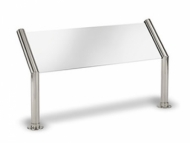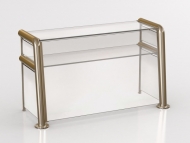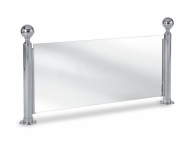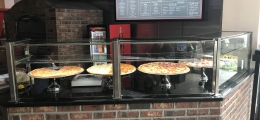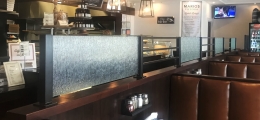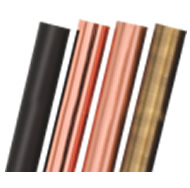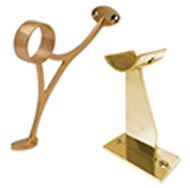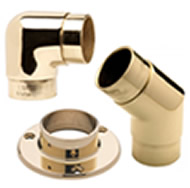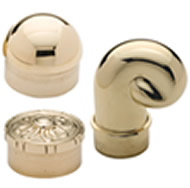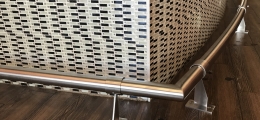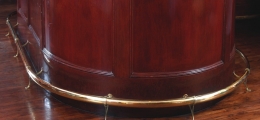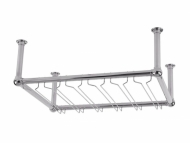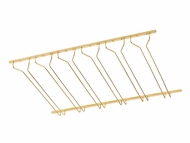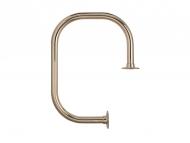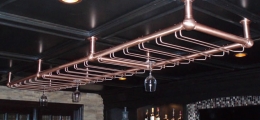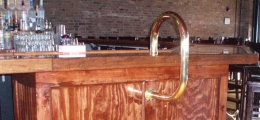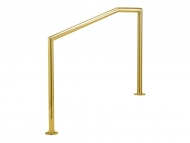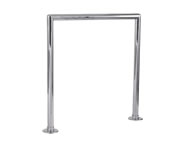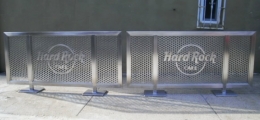Food shields, also referred to as sneeze guards, are glass or plastic barriers that protect prepared food from bacteria and other air-borne contaminants. Local health departments dictate the regulations that restaurants must follow regarding the use of food shields in their establishments. Virtually all self-service food bars and buffets are required to install and maintain suitable food shields.
Food sanitation and safety regulations are paramount to ensuring the health of consumers.
Over the past 75 years, food shields have evolved from flimsy, plastic partitions to permanent, eye-catching glass structures. A well-designed food shield serves double duty. While its main function is to protect a restaurant’s food from exposure to contamination, a stylish food shield can help actually display your food in a desirable way, adding to its appeal to customers.
Rules Regarding Sneeze Guards
State and national health regulation laws require that restaurants with buffets, hospital and school cafeterias, portable food carts and self-serve fast food displays have food shields. There are strict regulations regarding installation and utilization of food shields/sneeze guards. These parameters vary from state to state, and can sometimes differ across municipalities.
Food sanitation and safety regulations are paramount to ensuring the health of consumers. The necessity for a comprehensive and cohesive oversight organization led to the founding of NSF. “Known as ‘The Most Trusted Name in Food Safety’, NSF International has been helping businesses in the agriculture, processing, food equipment, restaurant, and retail industries to navigate the food safety and regulatory environment” since 1944.
The mission of NSF is to “protect and improve global human health. Manufacturers, regulators and consumers look to us to develop public health standards and certifications that help protect food, water, consumer products and the environment. As an independent, accredited organization, we test, audit and certify products and systems as well as provide education and risk management.”
NSF certification makes certain that the manufacturer of the product you are using/consuming has met strict standards for public health protection. These standards ensure the safety of the beverages, foods, and consumer products you purchase.
NSF standards are not enforced by all health departments. It is important that restaurant owner and managers educate themselves about their local health department codes. It is advisable to contact the health department of the county your restaurant is located in to obtain a list of compliance requirements.
Food Shield Guidelines
While the specific regulations for food shields/sneeze guards can vary, these basic rules apply across the board:
1. The height of any food guard needs to be tall enough for the average customer, who is between 5 and 6 feet tall.
2. A buffet sneeze guard should blend in with the decor of the restaurant. Frame color, shield size and installation affect the appearance of a restaurant.
3. All sneeze guards, including custom made sneeze guards, must not be movable by the customer or staff. Swinging sneeze guards cannot protect food. (Retrieved from USDA)
NSF has developed a series of requirements focused directly on food shields.These guidelines outline, in great detail, the specifications that must be followed to earn NSF certification. The directives include comprehensive diagrams with mandatory counter top, food shield, and flooring measurements.
They provide perimeters of food shield barrier height, distance between the food shield and floor, specifications about single and multi-tiered food shields, glass requirements, maximum splash zone radius, and a multitude of other important requirements. These intricate plans are available to view here. Remember, the NSF/ANSI standards are not federal requirements. They are suggested guidelines that have been established after years of research and collaboration with scientists and food safety experts.
Buying Food Shields
There is a wide range of options available in the market of food shield/sneeze guards. Every establishment has their own set of unique needs. It can be difficult to know which choice is correct for your restaurant. Some important aspects that should be incorporated into your decision include:
Portability – Food shields come in portable and permanent options. Food carts and rolling self-serve buffets may require structures that can be easily disassembled. Keep in mind that while convenient, portable food shields are less sturdy than their permanent counterparts.
Durability – Sneeze guards can be fabricated from plastic or glass. Plexiglas and acrylic food shields are less expensive; however they are also much less durable than glass. Also, glass food shields are significantly less susceptible to scratching. The glass should be thick enough to withstand the additional weight of food items and tempered in the case of accidental breakage.
Adaptability – You will want your food shield to be able to adjust to the variety of food items you are displaying in it. With this in mind, consider choosing an option with modular shelving. Stock food shields typically come in 1, 2, and 3 shelf configurations.
Ease of Cleaning – Cracks and crevices are no-no’s when it comes to sanitary food shields. Those shields that comply with NSF standards are designed with smooth edges and minimal gaps in the metal posts. Make note that certain metal finishes can be easier to keep clean than others. Glossy finishes can show fingerprints and streaks, while matte or satin finishes are easier to maintain.
Upgrades - Lighting can help you effectively merchandise your food selections. Heat lamps are excellent at keeping hot food warm without drying it out. Before ordering your food shield, discuss any upgrades with the manufacturer. Make sure your food shields are UL approved and properly wired for use near food and beverages.
If pre-fabricated food shields do not meet your needs, custom-built options are available. Most reputable suppliers are capable of fabricating a food shield to your specifications.
Before choosing a manufacturer, be sure to ask if the sneeze guards and food shields they construct meet NSF standards. Choosing products that follow these guidelines can prevent any problems with future health inspections and will guarantee that your food shield adequately protects the food you are displaying.
All of the food shields and sneeze guards fabricated and installed by ESP Metal Products and Crafts conform to the guidelines put forth by NSF. For more information about our products, contact us by phone at 631.284.6383 or via email at shop@espmetal.com.
TAGS: restaurants, food, pizza, design, helpful tips, pizzeria, food shields & sneeze guards, safety

